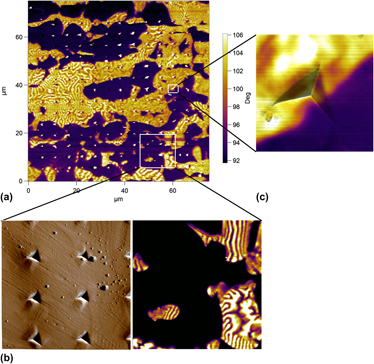Crossref Citations
This article has been cited by the following publications. This list is generated based on data provided by
Crossref.
Guo, L.Q.
Lin, M.C.
Qiao, L.J.
and
Volinsky, Alex A.
2013.
Ferrite and austenite phase identification in duplex stainless steel using SPM techniques.
Applied Surface Science,
Vol. 287,
Issue. ,
p.
499.
Lin, M. C.
Wang, G.
Guo, L. Q.
Qiao, L. J.
and
Volinsky, Alex A.
2013.
Electro-mechanical coupling of semiconductor film grown on stainless steel by oxidation.
Applied Physics Letters,
Vol. 103,
Issue. 14,
Guo, En-Yu
Xie, Hu-Xiao
Singh, Sudhanshu S.
Kirubanandham, Antony
Jing, Tao
and
Chawla, Nikhilesh
2014.
Mechanical characterization of microconstituents in a cast duplex stainless steel by micropillar compression.
Materials Science and Engineering: A,
Vol. 598,
Issue. ,
p.
98.
Taylor, M. D.
Matlock, D. K.
De Moor, E.
and
Speer, J. G.
2014.
Development of a Plane Strain Tensile Geometry to Assess Shear Fracture in Dual Phase Steels.
Journal of Materials Engineering and Performance,
Vol. 23,
Issue. 10,
p.
3685.
Pham, Thai-Hoan
Kim, Jung J.
and
Kim, Seung-Eock
2014.
Estimation of microstructural compositions in the weld zone of structural steel using nanoindentation.
Journal of Constructional Steel Research,
Vol. 99,
Issue. ,
p.
121.
Taylor, M.D.
Choi, K.S.
Sun, X.
Matlock, D.K.
Packard, C.E.
Xu, L.
and
Barlat, F.
2014.
Correlations between nanoindentation hardness and macroscopic mechanical properties in DP980 steels.
Materials Science and Engineering: A,
Vol. 597,
Issue. ,
p.
431.
Arutunow, Anna
Tobiszewski, Mateusz Tomasz
and
Darowicki, Kazimierz
2015.
Electrical and mechanical characterization of two-phase alloys by means of scanning probe microscopy in dynamic impedance spectroscopy mode.
Journal of Alloys and Compounds,
Vol. 619,
Issue. ,
p.
172.
Warren, A.D.
Harniman, R.L.
Collins, A.M.
Davis, S.A.
Younes, C.M.
Flewitt, P.E.J.
and
Scott, T.B.
2015.
Comparison between magnetic force microscopy and electron back-scatter diffraction for ferrite quantification in type 321 stainless steel.
Ultramicroscopy,
Vol. 148,
Issue. ,
p.
1.
Pham, Thai-Hoan
and
Kim, Seung-Eock
2015.
Nanoindentation for investigation of microstructural compositions in SM490 steel weld zone.
Journal of Constructional Steel Research,
Vol. 110,
Issue. ,
p.
40.
Abu Al-Rub, Rashid K.
Ettehad, Mahmood
and
Palazotto, Anthony N.
2015.
Microstructural modeling of dual phase steel using a higher-order gradient plasticity–damage model.
International Journal of Solids and Structures,
Vol. 58,
Issue. ,
p.
178.
Alinejad, H.
Korojy, B.
Ebrahimi, G.R.
and
Momeni, A.
2016.
Microstructure and flow behavior of cast 2304 duplex stainless steel at elevated temperatures.
Journal of Materials Research,
Vol. 31,
Issue. 24,
p.
3939.
Ariza, E.A.
Nishikawa, A.S
Goldenstein, H.
and
Tschiptschin, A.P.
2016.
Characterization and methodology for calculating the mechanical properties of a TRIP-steel submitted to hot stamping and quenching and partitioning (Q&P).
Materials Science and Engineering: A,
Vol. 671,
Issue. ,
p.
54.
Warren, A. D.
Harniman, R. L.
Guo, Z.
Younes, C. M.
Flewitt, P. E. J.
and
Scott, T. B.
2016.
Quantification of sigma-phase evolution in thermally aged 2205 duplex stainless steel.
Journal of Materials Science,
Vol. 51,
Issue. 2,
p.
694.
Hu, Zhihao
Ning, Kaijie
and
Lu, Kathy
2016.
Study of spark plasma sintered nanostructured ferritic steel alloy with silicon carbide addition.
Materials Science and Engineering: A,
Vol. 670,
Issue. ,
p.
75.
Rahimi, Reza
Ullrich, Christiane
Rafaja, David
Biermann, Horst
and
Mola, Javad
2016.
Microstructural Evolution of an Al-Alloyed Duplex Stainless Steel During Tensile Deformation Between 77 K and 473 K (−196 °C and 200 °C).
Metallurgical and Materials Transactions A,
Vol. 47,
Issue. 6,
p.
2705.
Verma, Jagesvar
Taiwade, Ravindra V.
and
Sonkusare, Reshma
2017.
Effects of austenitic and duplex electrodes on microstructure, mechanical properties, pitting, and galvanic corrosion resistance of ferritic and dual-phase stainless steel dissimilar joints.
Journal of Materials Research,
Vol. 32,
Issue. 16,
p.
3066.
Argandoña, Gorka
Palacio, José
Berlanga, Carlos
Biezma, María
Rivero, Pedro
Peña, Julio
and
Rodriguez, Rafael
2017.
Effect of the Temperature in the Mechanical Properties of Austenite, Ferrite and Sigma Phases of Duplex Stainless Steels Using Hardness, Microhardness and Nanoindentation Techniques.
Metals,
Vol. 7,
Issue. 6,
p.
219.
Schwarm, Samuel C.
Kolli, R. Prakash
Aydogan, Eda
Mburu, Sarah
and
Ankem, Sreeramamurthy
2017.
Characterization of phase properties and deformation in ferritic-austenitic duplex stainless steels by nanoindentation and finite element method.
Materials Science and Engineering: A,
Vol. 680,
Issue. ,
p.
359.
Pham, Thai-Hoan
and
Kim, Seung-Eock
2017.
Characteristics of microstructural phases relevant to the mechanical properties in structural steel weld zone studied by using indentation.
Construction and Building Materials,
Vol. 155,
Issue. ,
p.
176.
Tao, Ping
Gong, Jian-ming
Wang, Yan-fei
Jiang, Yong
Li, Yang
and
Cen, Wei-wei
2018.
Characterization on stress-strain behavior of ferrite and austenite in a 2205 duplex stainless steel based on nanoindentation and finite element method.
Results in Physics,
Vol. 11,
Issue. ,
p.
377.



